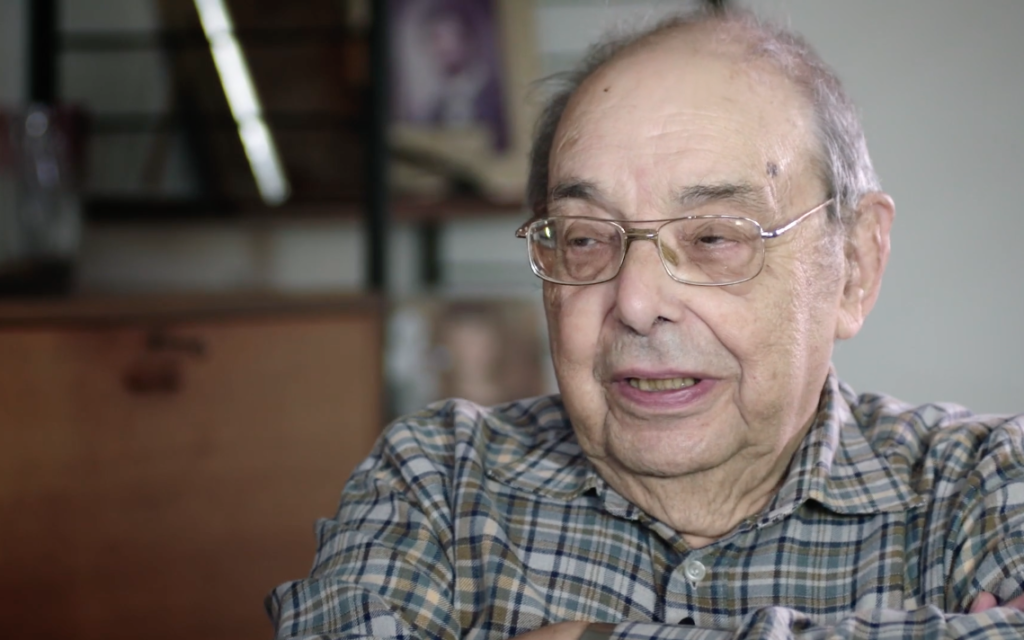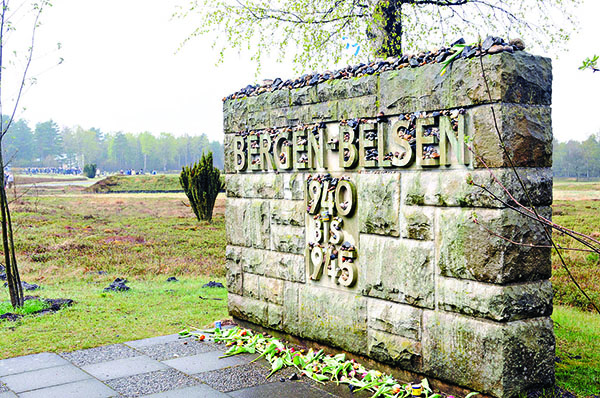He’s the man who helped Belsen survivors build the new state of Israel
Marking the 75th anniversary of the camp's liberation by the British Army, Herbert Haberberg, 95, recalls his extraordinary life in which he helped build the fledgling Jewish state
On one of his regular visits to the survivors of the liberated Belsen concentration camp in 1946, Herbert Haberberg, in his British army uniform, was assailed by a local German woman.
“When”, she demanded, “are you going to get these sub-humans out of here?”
Herbert was only 22, but he didn’t miss a beat. “Have you looked in the mirror lately?” he responded. “What do you mean?” she said furiously. “Well, you ought to know what a sub-human looks like”, the young private said, walking away.
Get The Jewish News Daily Edition by email and never miss our top stories Free Sign Up
An extraordinary set of circumstances had led to Herbert Haberberg being at Belsen at all. Speaking to the Jewish News to mark the 75th anniversary of the camp’s April 1945 liberation by the British Army, the retired metal trader, now 95, recalled a remarkable life in which he effectively helped build the young state of Israel. He did this as the Jewish Agency’s man on the ground in Germany, using his fluent Yiddish to persuade the broken survivors to go to Palestine.
Aged 14, Herbert and his little brother Manfred, aged six, travelled to Britain on the Kindertransport, but the boys were separated. And it was during this period of separation, while with other Jewish teenagers, that Herbert began to learn Yiddish, not a language his parents had ever spoken at home. It took him six months to learn English, but he picked up Yiddish, taught by a Polish academic, quickly, and was speaking it well after two months.
Neither Herbert nor Manfred learned of their parents’ fate until long after the war. Both, it transpired, had died in 1942, their father having been shot in a forest while his mother had been transported to a concentration camp.
For a time Herbert worked at a series of uninspiring jobs until he was able to join up in 1944, seeing action in Italy as a member of the Jewish Brigade, a division of the British army. “I joined up to fight the Germans”, he says, but by 1946, still in uniform, he was stuck in a records office in Hamburg, bored and somewhat disinclined to go drinking in a Naafi canteen at weekends.
But by chance a Church of England clergyman suggested he should meet the Jewish Relief Unit, a group of volunteers from Britain, trying to do what they could in social and welfare work for the Belsen survivors.
By this time the original Belsen camp had been destroyed by the British, because of a wave of typhoid, which was killing, says Herbert, “about 2,000 people a month”. The survivors were moved to a Displaced Persons, or DP camp, nearby; it remained open until 1950.
“The Jewish Relief Unit had one great drawback — almost none of them spoke Yiddish.” And that was the vital language to communicate with those Jews who were in the DP camp at the time, because these were people who could not return to their homes in eastern Europe, and for whom Yiddish was their mother tongue.
So Herbert Haberberg began spending every weekend at the camp, talking to these Jews, aged between 15 and 55, who were living in what he says were “abysmal conditions. The British government didn’t want to know, and their main idea was to prevent these people getting in to [mandate] Palestine”.
Herbert had other ideas. Working with “the wonderful Jewish Relief Unit”, he was able to use his Yiddish to persuade the survivors to go to southern Europe and then board the illegal ships to Palestine. And a large number of them did so. “These people were frustrated, demoralised, they felt they had no future. So going to what became the state of Israel… it was a good choice”.
Even all these years later, recalling his experiences at the Belsen DP camp, Herbert Haberberg is circumspect, not wanting to give away every secret. But he has one marvellous story of how the Polish guards left in the camp by the British, “disappeared overnight”.
Herbert used to arrive on Fridays to spend the weekend with the survivors. One Friday he found the Polish guards “looting the supply lorries.” The following weekend it happened again. On the third weekend, Herbert “got hold of some of my, shall we say, Palestinian friends who had remained behind”. Presumably these were Jewish Agency agents.
“The next Friday a jeep pulled up outside the guards’ hut, and four immaculately dressed ‘British army officers’ got out, with swagger sticks and a search warrant — and “I won’t tell you where the search warrant came from. They went in, and they found a lot of money and some gold bars. The next day, the Poles had departed. They didn’t want to go back to Poland, but they all did.”
Herbert himself never made it to the young state of Israel. At first he was advised by the Jewish Agency that he was more useful to them in Germany, where he stayed until his demobilisation in 1948. And then he got married, became a very successful metal trader — as did his brother, Manfred — and built a family in Britain. Today he lives in Cockfosters, in north London — the former Private Haberberg, with a remarkable story to tell.

Thank you for helping to make Jewish News the leading source of news and opinion for the UK Jewish community. Today we're asking for your invaluable help to continue putting our community first in everything we do.
For as little as £5 a month you can help sustain the vital work we do in celebrating and standing up for Jewish life in Britain.
Jewish News holds our community together and keeps us connected. Like a synagogue, it’s where people turn to feel part of something bigger. It also proudly shows the rest of Britain the vibrancy and rich culture of modern Jewish life.
You can make a quick and easy one-off or monthly contribution of £5, £10, £20 or any other sum you’re comfortable with.
100% of your donation will help us continue celebrating our community, in all its dynamic diversity...
Engaging
Being a community platform means so much more than producing a newspaper and website. One of our proudest roles is media partnering with our invaluable charities to amplify the outstanding work they do to help us all.
Celebrating
There’s no shortage of oys in the world but Jewish News takes every opportunity to celebrate the joys too, through projects like Night of Heroes, 40 Under 40 and other compelling countdowns that make the community kvell with pride.
Pioneering
In the first collaboration between media outlets from different faiths, Jewish News worked with British Muslim TV and Church Times to produce a list of young activists leading the way on interfaith understanding.
Campaigning
Royal Mail issued a stamp honouring Holocaust hero Sir Nicholas Winton after a Jewish News campaign attracted more than 100,000 backers. Jewish Newsalso produces special editions of the paper highlighting pressing issues including mental health and Holocaust remembrance.
Easy access
In an age when news is readily accessible, Jewish News provides high-quality content free online and offline, removing any financial barriers to connecting people.
Voice of our community to wider society
The Jewish News team regularly appears on TV, radio and on the pages of the national press to comment on stories about the Jewish community. Easy access to the paper on the streets of London also means Jewish News provides an invaluable window into the community for the country at large.
We hope you agree all this is worth preserving.
-
By Brigit Grant
-
By Laurent Vaughan - Senior Associate (Bishop & Sewell Solicitors)
-
By Laurent Vaughan - Senior Associate (Bishop & Sewell Solicitors)
-
By Laurent Vaughan - Senior Associate (Bishop & Sewell Solicitors)
-
By Laurent Vaughan - Senior Associate (Bishop & Sewell Solicitors)























